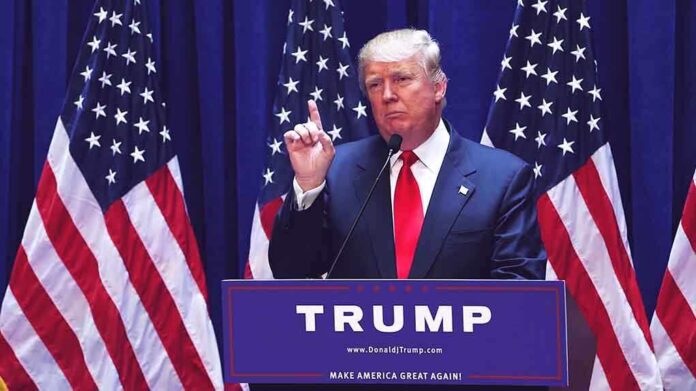Trump selects Brendan Carr as FCC chair, promising a shift in regulatory approach and a focus on free speech.
At a Glance
- Brendan Carr, a Republican FCC commissioner since 2017, has been chosen by Trump to lead the agency
- Carr plans to end the FCC’s focus on diversity, equity, and inclusion (DEI)
- He aims to dismantle what he calls a “censorship cartel” amid claims of anti-Republican bias from big tech companies
- Carr supports expanding FCC oversight to include major tech companies like Google and Apple
- He opposes the reinstatement of net neutrality rules and advocates for limiting Section 230
Trump’s Choice for FCC Leadership
President-elect Donald Trump has announced his selection of Brendan Carr to chair the Federal Communications Commission (FCC). Carr, a Republican who has served as an FCC commissioner since 2017, is known for his staunch advocacy of free speech and criticism of big tech companies. This appointment signals a potential shift in the agency’s regulatory approach, with implications for technology policy and telecommunications governance.
Carr’s nomination comes with high praise from Trump, who views him as a champion for free speech and an opponent of regulatory measures that have allegedly hindered economic growth. The President-elect’s endorsement highlights Carr’s potential role in reshaping the FCC’s priorities and regulatory framework.
Carr’s Vision for the FCC
As the potential new FCC chair, Carr has outlined several key objectives that could significantly alter the agency’s direction. One of his primary goals is to end what he describes as a “regulatory onslaught” that he believes has impeded job creation and innovation, particularly in rural America. Carr also plans to shift the FCC’s focus away from diversity, equity, and inclusion (DEI) initiatives, a move that aligns with broader conservative critiques of such programs.
“Commissioner Carr is a warrior for free speech and has fought against the regulatory lawfare that has stifled Americans’ freedoms and held back our economy. He will end the regulatory onslaught that has been crippling America’s job creators and innovators and ensure that the FCC delivers for rural America.” – Source
A central aspect of Carr’s agenda is his commitment to dismantling what he terms a “censorship cartel.” This refers to alleged collaborations between tech companies, social media platforms, and the current administration that Carr believes have infringed upon free speech rights. His stance on this issue has garnered support from those concerned about perceived bias against conservative viewpoints on major online platforms.
Expanding FCC Oversight
Carr advocates for an expanded role for the FCC, proposing that the agency’s oversight should extend to major tech companies such as Google and Apple. This position represents a significant departure from the FCC’s traditional focus on telecommunications and broadband providers. Carr argues that this broader authority is necessary to address issues of censorship and viewpoint discrimination on digital platforms.
“We must dismantle the censorship cartel and restore free speech rights for everyday Americans.” – Source
In line with this expanded oversight, Carr has suggested limiting Section 230 of the Communications Decency Act. This law currently provides liability protections for online platforms regarding user-generated content. Carr’s proposal to modify Section 230 is aimed at addressing what he perceives as viewpoint discrimination by tech platforms, a concern shared by many conservatives.
Controversies and Criticisms
While Carr’s nomination has been welcomed by those who share his views on tech regulation and free speech, it has also faced criticism from various quarters. Opponents argue that his approach could lead to reduced protections for marginalized groups online and potentially compromise the independence of the FCC. Critics also express concern about Carr’s stance on net neutrality, which he opposes reinstating.
“Carr doesn’t care about protecting the public interest; he got this job because he will carry out Trump and Elon Musk’s personal vendettas.” – Source
Carr’s criticism of the FCC’s decision to revoke an $885 million grant to Elon Musk’s Starlink satellite internet project has also drawn attention. He characterized this decision as “regulatory lawfare” against Musk, a stance that aligns with his broader skepticism of regulatory actions that he believes hinder technological innovation and economic growth.
Looking Ahead
As Brendan Carr prepares to potentially lead the FCC, the telecommunications and tech industries are bracing for significant policy shifts. His appointment could herald a new era of regulatory approach, focusing on free speech protection, reduced oversight in certain areas, and increased scrutiny of big tech companies. The coming months will likely see intense debate over the direction of the FCC and its role in shaping the future of America’s digital landscape.
Sources:
- Brendan Carr Outlines His First Targets After Trump FCC Pick
- Trump picks Big Tech critic who wrote ‘Project 2025’ chapter to lead FCC











